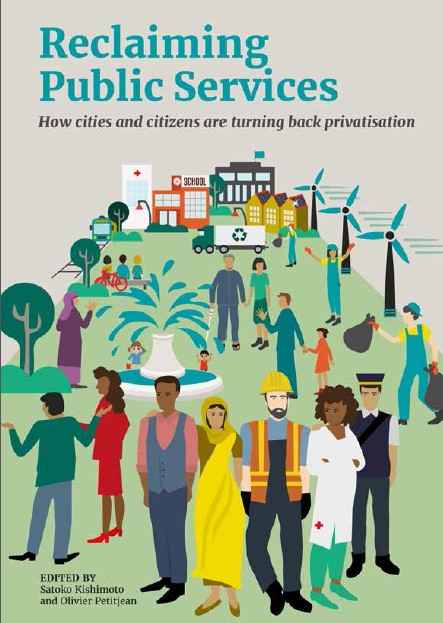|
Blog Feeds
Anti-Empire
Human Rights in IrelandA Blog About Human Rights
Lockdown Skeptics
Voltaire NetworkVoltaire, international edition
|
The Spectre Haunting Europe international |
economics and finance |
other press international |
economics and finance |
other press
 Monday December 04, 2017 23:21 Monday December 04, 2017 23:21 by 1 of indy by 1 of indy
 This is a repost of an recent article (Dec 1st) by economic analyst and trade unionist Michael Taft on www.tasc.ie covering the good news trend where there is now a trend in Europe of reversing privatisations. And that is certainly something positive. The Transnational Institute has published a comprehensive report: ‘Reclaiming Public Services: How Cities and Citizens are Turning Back Privatisation’. at https://www.tni.org/files/publication-downloads/reclaim...s.pdf
There were de-privatisations in waste services, public transport, education services, and health care and social work. The activities go beyond what might be considered traditional public services and traditional public ownership. For instance, Vienna has re-municipalised theatres and cinemas some of which are now under the control of associations manged by workers and citizens. This shows that public ownership doesn’t necessarily mean the ‘state’ – it can also mean civil society groups taking charge of activities. In Mouans-Sartoux, France, municipality even bought a piece of farmland and employed a farmer to provide the local school restaurants with 100 per cent organic food. In many cases, de-privatisation occurred for largely defensive reasons. Costa and were rising, investment was falling, working conditions were deteriorating and/or the quality of the service was falling. In other cases, the local government was creating new activity or wanted to co-ordinate the activity with other public goals. Underlining all this, however, was the experience that privatisation wasn’t working. In Ireland, there are only two examples, both in Northern Ireland: hospital cleaning and waste recycling (Banbridge District Council). In the Republic, we can only surmise that privatisation is doing great and has no need of reform; or that we don’t evaluate and act upon the results. I suspect the latter. Take bin services, for example. I have written on this topic previously: ‘The bin charges debacle is spiralling into chaos. We have areas where two or three or four bin companies operate and other areas where companies are threatening to leave; escalating charges becoming an intolerable burden on many low-income households; considerable price variations between counties; off-shored private companies pursuing wage suppression to increase profits; considerable illegal dumping; charges for recycling which dis-incentivises a social good; and on and on. This is not a waste management policy; it is a circus.’ There is a strong argument for returning waste collection to public ownership. This doesn’t necessarily mean that local government or a public agency would direct supply the service, though it could; they could tender – but for whole markets (e.g. Cork City Council could tender for all of Cork). Regardless of the process, there would need to be public oversight, strong labour regulations, price controls and transparent financial accounts. But there are positive reasons to extend public ownership – either through local agencies or civil society organisations. We saw that in Somerset, Kentucky, the local council set up a public petrol station to take on the price-cartel operated by the private providers. In other cases, public ownership can earn profits and dividends from commercial activities which can then be re-invested into public services. In still other areas, public ownership can provide economy activity in depressed areas where private capital is in short supply. In short, there is an opportunity to re-invent public services and public ownership. This is what they are doing in other jurisdictions. Let’s hope that the spectre haunting Europe reaches our shores sometime in the near future. Note: the list of re-municipalisations start on page 178 of the report linked above
|




















 printable version
printable version

 Digg this
Digg this del.icio.us
del.icio.us Furl
Furl Reddit
Reddit Technorati
Technorati Facebook
Facebook Gab
Gab Twitter
Twitter